
Speaker or author: Crummell, Alexander, 1819-1898
Newspaper or publication: Presscopy -- New York Public Library -- Schomburg Collection
Lengthy speech justifying the idea of colonization based on evangelization of Africa. The speaker believed that this was the divine duty of the Negro race since Africa was their spiritual home. The speaker presented a history of Africa and slavery to provide a basis for his reasoning.
Description of file(s): PDF 38 page, 11,220 word document (text and images)
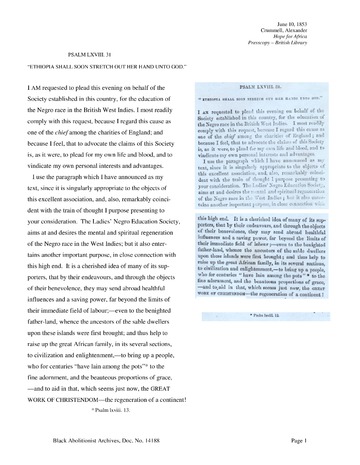
Speaker or author: Crummell, Alexander, 1819-1898
Newspaper or publication: Presscopy -- British Library
Lengthy sermon regarding the history of slavery, the abuses suffered by slaves in the U.S., and the necessity for evangelizing (and colonizing) Africa.
Description of file(s): PDF 40 page, 14,207 word document (text and images)
(page1).jpg.jpg)
Title: Anglo-African Magazine - January, 1859
Speaker or author: editor
Newspaper or publication: Anglo-African Magazine (1859 - 1860)
The writer stresses the strength and determination of African Americans as they have endured injustices over the history of African slavery and prejudice. He mentions several anecdotal stories to prove his point, and assures his readers that African Americans will not only prevail but continue to outnumber the white population.
Description of file(s): three scanned magazine pages (7 columns)
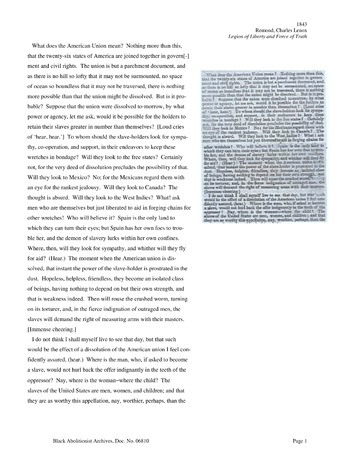
Speaker or author: Remond, Charles Lenox, 1810-1873
Newspaper or publication: Legion of Liberty and Force of Truth
Speech given in Dublin regarding the irony of slavery in a country (America) which stresses freedom and equality above all else. Emphasis is placed on the hopeless and helpless condition of every slave living in the U.S.
Description of file(s): PDF 2 page, 454 word document (text and images)
(page1).jpg.jpg)
Title: Colored American - July 27, 1839
Speaker or author: editor
Newspaper or publication: Colored American (1837 - 1842)
The writer relates an interview with a nameless government official in the British West Indies regarding the condition of the country. After emancipation of these islands, this official explains that none of the feared violence and "ruin" has come to pass.
Description of file(s): one scanned, two columned, newspaper page
(page1).jpg.jpg)
Title: Colored American - July, 1838
Speaker or author: editor
Newspaper or publication: Colored American (1837 - 1842)
The writer announces that the idea of apprenticeship as a way to slowly emancipate slaves in the British West Indies has been abandoned. As of August 1st, the slaves of the British West Indies will be completely emancipated.
Description of file(s): one scanned, one columned, newspaper page
(page1).jpg.jpg)
Title: Colored American - June 16, 1838
Speaker or author: editor
Newspaper or publication: Colored American (1837 - 1842)
The writer explains that when the British Parliment first passed the Emancipation Act to free the slaves of the British West Indies, they tacked on an apprenticeship of six years to the deal. This was done out of fear of what may happen if the thousands of slaves were freed at once. The islands, however, rejected this clause and provided their slaves with immediate emancipation. The feared violence never manifested. It is now up to Parliament to revise their law.
Description of file(s): one scanned, one columned, newspaper page
(page1).jpg.jpg)
Title: Colored American - June 8, 1839
Speaker or author: editor
Newspaper or publication: Colored American (1837 - 1842)
The writer describes the actions of a pro-slavery faction operating in the newly emancipated British West Indies. These men are attempting to continue the oppression of newly freed slaves by making their lives unbearable.
Description of file(s): one scanned, two columned, newspaper page
(page1).jpg.jpg)
Title: Colored American - June 9, 1838
Speaker or author: editor
Newspaper or publication: Colored American (1837 - 1842)
The writer questions the fears of immediate emancipation of slaves in the U.S. that seem to be holding back legislation that will free the slaves. He points to the emancipation of the British West Indies as proof that this can be done without the bloodshed that opponents of immediate emancipation fear most.
Description of file(s): one scanned, one columned, newspaper page
(page1).jpg.jpg)
Title: Colored American - November 10, 1838
Speaker or author: editor
Newspaper or publication: Colored American (1837 - 1842)
The editor shares articles with his readers indicating the growing unrest between the northern and southern states over the issue of slavery.
Description of file(s): one scanned, two columned, newspaper page
(page1).jpg.jpg)
Title: Colored American - November 16, 1839
Speaker or author: editor
Newspaper or publication: Colored American (1837 - 1842)
The writer compares and contrasts voluntary immigration to the western states and various other countries with the restrictions and demands of Colonization. While voluntary immigration can be useful to a society, scheme's like Colonization work against it.
Description of file(s): two scanned, two columned, newspaper pages
(page1).jpg.jpg)
Title: Colored American - November 16, 1839
Speaker or author: editor
Newspaper or publication: Colored American (1837 - 1842)
The writer notes the success of immediate emancipation in other countries, and expresses his belief that the U.S. must follow suit.
Description of file(s): one scanned, two columned, newspaper page
(page1).jpg.jpg)
Title: Colored American - October 2, 1841
Speaker or author: editor
Newspaper or publication: Colored American (1837 - 1842)
The writer reports on Joseph John Gurney's visit to France, and gives a general overview of his efforts in the work towrads universal emancipation.
Description of file(s): one scanned newspaper column
(page1).jpg.jpg)
Title: Colored American - September 22, 1838
Speaker or author: editor
Newspaper or publication: Colored American (1837 - 1842)
The writer expresses his view that as each country outside the U.S. frees its slaves, the U.S. gets closer to the end of slavery. The writer holds that universal emancipation is on the horizon. He asks his readers to be encouarged and to be patient.
Description of file(s): one scanned, two columned, newspaper page
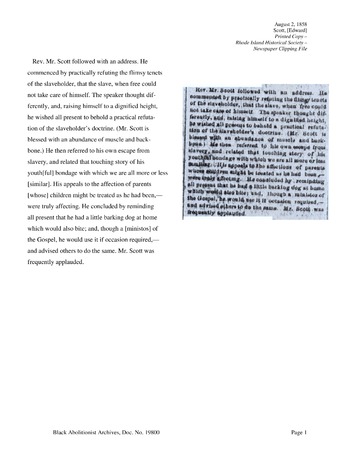
Speaker or author: Scott, Edward, fl. 1857
Newspaper or publication: Printed Copy -- Rhode Island Historical Society -- Newspaper Clipping File
Speech delivered during a celebration on the anniversary of the emancipation of the British West Indies. The speaker disputed the idea that the freed slaves could not care for themselves.
Description of file(s): PDF 1 page, 158 word document (text and image)
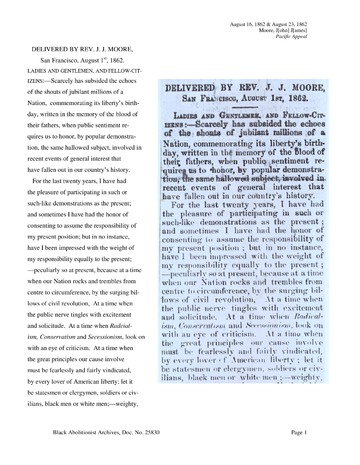
Speaker or author: Moore, John Jamison, 1818-1893.
Newspaper or publication: Pacific Appeal
Speech delivered in celebration of the emancipation of Washington, DC. The speech also commemorated the anniversary of the emancipation of the British West Indies. The speaker stressed the challenges that lay ahead for the country regarding the changes from a slave driven economy to a free wage economy. He traced the history of the abolitionist movement and emphasized his belief in the realization of total U. S. emancipation. (Speech 25858 is combined with this speech and included at the end of speech 25830.)
Description of file(s): PDF 13 page, 2,832 word document (text and images)
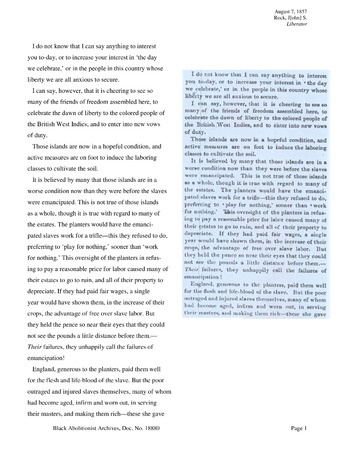
Speaker or author: Rock, John S. (John Sweat), 1825-1866
Newspaper or publication: Liberator
Speech given during the 23rd anniversary of the emancipation of the British West Indies. The speaker gave a brief overview of the current condition of the West Indies, and the work that still lies ahead for the population there.
Description of file(s): PDF 4 page, 914 word document (text and images)
(page1).jpg.jpg)
Title: Pacific Appeal - July 30, 1864
Speaker or author: editor
Newspaper or publication: Pacific Appeal (1862 - 188?)
The writer announces the end of the annual August 1st celebration of the emancipation of the British West Indies. From now on, he urges his readers to celebration their own emancipation on the January 1st anniversary of the Emancipation Proclamation instead.
Description of file(s): one scanned newspaper column
(page1).jpg.jpg)
Title: Provincial Freeman - June 10, 1854
Speaker or author: Ward, Samuel Ringgold, b. 1817
Newspaper or publication: Provincial Freeman (1853 - 1859)
In a letter to the editor, the writer describes two types of aboltionists: both want freedom for the slave, but one type wants this freedom limited and restricted. There are more of this type than of those working for true human equality. His view of freedom includes human equality and civil rights, and it's this view that he encourages among those who claim to be abolitionists.
Description of file(s): two scanned, two columned, newspaper pages
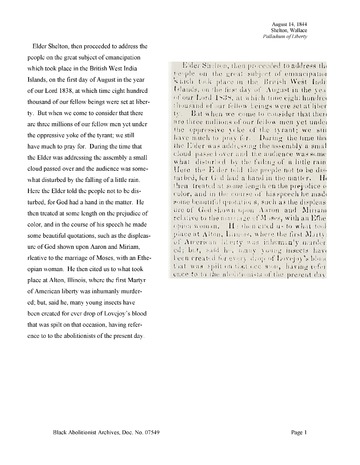
Speaker or author: Shelton, Wallace
Newspaper or publication: Palladium of Liberty (1843 - 1844)
Speech given during the celebration of the emancipation of slaves in the British West Indies on August 1, 1834. Stress is placed on the continued existence of slavery in the U.S.
Description of file(s): PDF 1 page, 229 word document (text and image)
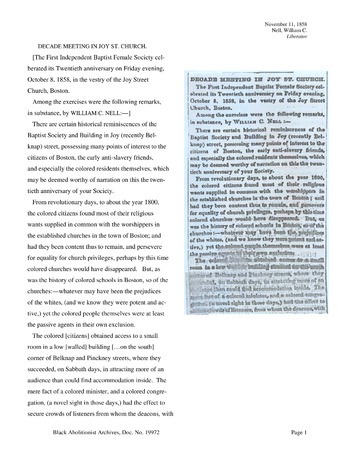
Speaker or author: Nell, William C. (William Cooper), 1816-1874.
Newspaper or publication: Liberator
Speech delivered during the celebration of the 20th anniversary of the First Independent Baptist Female Society and the church where their meetings were held. The speaker gave an overview of the history of the church and parish, and the accomplishments of the organization.
Description of file(s): PDF 6 page, 1,493 word document (text and images)
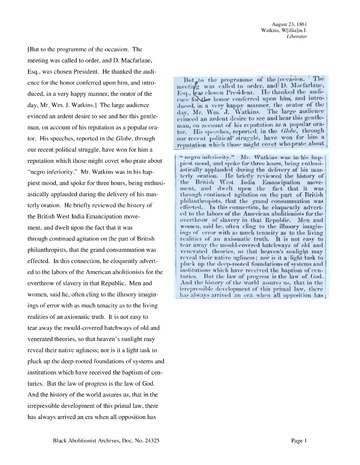
Speaker or author: Watkins, William J.
Newspaper or publication: Liberator
Overview delivered before a Canadian audience in celebration of the August 1st anniversary of the emancipation of the British West Indies. The speaker was encouraged by the success of this act of reason by the British and stressed that this offered proof that a peaceful end to slavery was possible in the U. S. as well. The speaker believed that the Civil War would provide the death blow to the system of slavery once and for all.
Description of file(s): PDF 4 page, 943 word document (text and images)
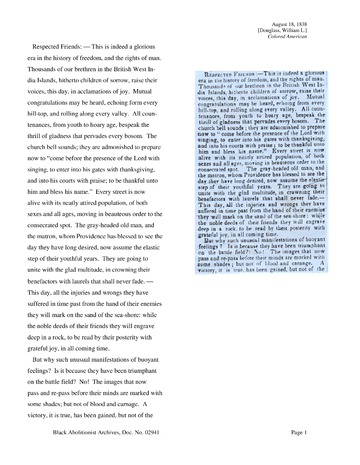
Speaker or author: Douglass, William L.
Newspaper or publication: Colored American (1837 - 1842)
Speech given on the anniversary of the abolition of slavery in the British West Indies in August, 1833, with emphasis placed on how the U.S. should follow Britain in abolishing slavery.
Description of file(s): PDF 8 page, 2,295 word document (text and images)
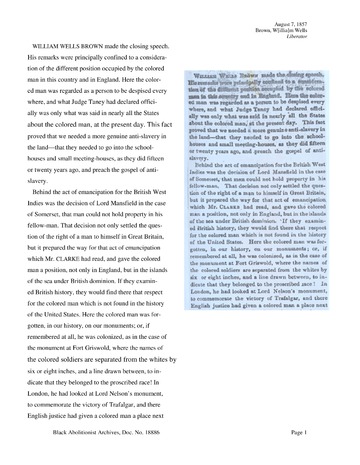
Speaker or author: Brown, William Wells, 1814?-1884
Newspaper or publication: Liberator
Speech regarding the military history of black war heroes relating stories of their heroism. The speaker also addressed the court case that led to the emancipation of England and the British West Indies.
Description of file(s): PDF 4 page, 1,157 word document (text and images)
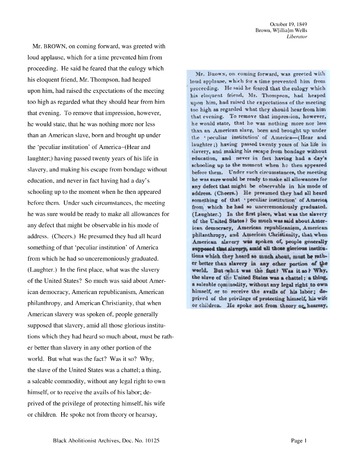
Speaker or author: Brown, William Wells, 1814?-1884
Newspaper or publication: Liberator
Speech delivered before a large meeting in London regarding the status of the anti-slavery movement in the U. S. The speaker was responding to another speaker who insisted that the free people of color living in the eastern states had a better life than those enslaved in the south.
Description of file(s): PDF 6 page, 1,788 word document (text and images)



